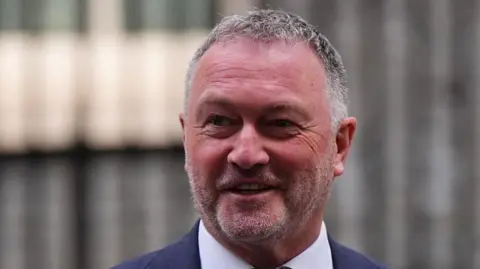**Sewage Discharges to be Halved by 2030, Minister’s Commitment**
In a significant announcement, Environment Secretary Steve Reed has solemnly pledged to reduce the number of sewage discharges by water companies in England by 50% by the year 2030. This bold commitment comes as a direct response to widespread public discontent triggered by an alarming escalation in pollution incidents as reported by the Environment Agency. For the first time, it is notable that government ministers are setting explicit targets concerning this pressing environmental concern.
The recent statistics released by the Environment Agency disclosed an astonishing 60% increase in serious pollution incidents recorded for the year 2024, marking it as the highest yearly total ever documented. Reed highlighted the distress experienced by families witnessing their local rivers, lakes, and coastlines suffering due to unprecedented pollution levels. In light of these issues, the Conservative Party has criticized Labour’s initiatives, alleging that they have failed to stem rising water bills despite their grand promises to reform the water sector.
This assurance to halve sewage discharges forms an integral part of a broader governmental strategy aimed at enhancing the performance of the UK water industry. This strategic framework has been meticulously curated ahead of an influential Water Commission review expected to be unveiled shortly.
The government’s comprehensive plan further emphasizes a collaborative approach with the devolved administrations throughout the UK to impose a ban on plastic-containing wet wipes among other decisive measures. Reed is also poised to reveal intentions to cut phosphorus pollution emitted from treated wastewater by half by the year 2028, benchmarked against 2024 pollution levels. Phosphorus contributes to harmful algae blooms, which pose significant risks to aquatic ecosystems.
There has been heightened scrutiny directed towards water companies over the increasing instances of sewage discharged into UK waterways, especially given the context of rising customer bills. Meanwhile, it raises eyebrows that these companies have simultaneously disbursed millions in bonuses to executives and shareholders. In a concerning revelation, the Environment Agency registered a staggering total of 2,801 pollution incidents in 2024, compared to the 2,174 incidents reported in the previous year. Alarmingly, 75 of these incidents were categorized as inflicting “serious or persistent” harm—up from 47 in 2023—affecting fisheries, drinking water quality, and public health.
While these statistics paint a grim picture, it’s worth noting that water executives in England collectively received £7.6 million in bonuses. In June, as a remedial measure, the government prevented bonus payouts at six firms that had previously violated environmental and consumer standards.
In anticipation of the Water Commission’s report, which will lay the groundwork for improving the environmental and financial facets of the water sector, significant changes may be on the horizon. Early reports indicated that the review might recommend the abolition of the water regulator, Ofwat. Government representatives have remained reticent in response to such speculation.
The infrastructure in England is designed as a combined sewage system, which means that both rainfall runoff and sewage are processed through the same channels. Last year, elevated rainfall levels may have overwhelmed the water companies’ infrastructure, contributing to the rise in discharges. However, regardless of rainfall intensity, any sewage discharge causing serious pollution constitutes a violation of operational permits.
Many of these incidents are self-reported by the companies to the Environment Agency, yet from around 4,000 inspections carried out last year, nearly 25% of facilities were found in violation of their permits. In an effort to tackle these systemic issues, a historic £104 billion investment is earmarked for the water sector over the next five years to bolster its infrastructure.
This considerable expenditure will inevitably lead to a hike in consumer bills, estimated to increase by an average of £123 per household annually, with Southern Water customers possibly facing increases as high as £224. The Environment Agency has been allocated £189 million to sustain numerous enforcement officers focusing on inspections and prosecutions against non-compliant water companies; the aim being that returned fines will fund these oversight activities.
Conservative shadow environment secretary Victoria Atkins stressed the necessity for the government to provide transparency regarding the £104 billion investment, acknowledging that part of it would be sourced from increased consumer bills. She underscored that plans must also include viable strategies to bolster the water system’s resilience against droughts while minimizing the financial burden on ratepayers and taxpayers alike.
This commitment and the surrounding discussions highlight an important pivot in addressing one of the most pressing environmental concerns faced by the UK, reflective of increased public demand for accountability and reform in the water industry.








